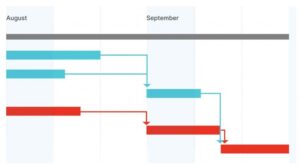Everything should be made as simple as possible, but not simpler. ~Albert Einstein

Project Management is the application of knowledge, skills, tools, and techniques to project activities to meet project requirements. It has the following processes:
- Initiating
- Planning
- Executing
- Controlling
- Closing
The project team manages the work of the projects which typically involves:
- Competing demands for scope, time, cost, risk and quality
- Stakeholders with differing needs and expectations.
- Changes in user requirement (ie. Client Specification)
A project was defined as distinct from operations in that operations are on-going and repetitive, whereas projects are temporary and unique.
- Temporary means that every project has a definite beginning and a definite end.
- Unique means that the product is different in some distinguishing way from all similar products.
(PMBOK Guide, 2000 Extract)
There are 2 distinct project types:
- Capital Projects – ie. construction, expansion, renovation or replacement project for a new or an existing facility.
- Change Management – a structured approach to move organizations from a current state to a desired future state. Ie. Change of a supply network, embedding a formal S&OP process.
Quick links: